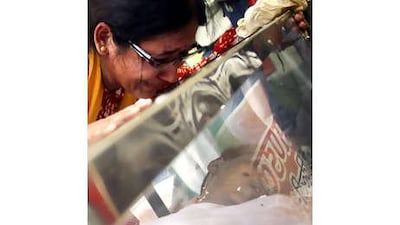MUMBAI // The killing of a Maoist leader and a key proponent of dialogue with the government has greatly diminished hopes of a truce with the rebels, a government negotiator said. "His death is a setback to the entire peace process," Swami Agnivesh, a saffron-robed Hindu spiritual leader and social activist, said in an interview. "He was all for peace and dialogue. If he hadn't been killed, the Maoists would have announced a 72-hour ceasefire with the government."
The rebel leader in question is Cherukuri Raj Kumar, well known by his nom de guerre Azad, who was killed on July 1 in the jungles of central India in a three-hour gun battle with the police of Andhra Pradesh state. A rebel spokesman and number three in the Maoist hierarchy, Azad was at the time headed to a guerrilla hideout in the Bastar region to deliver to senior Maoist commanders a letter by Swami Agnivesh urging the rebels to renounce violence and come to the negotiating table.
Swami Agnivesh said he was expecting Azad to reply to him this month with a possible date for a three-day-long ceasefire by the rebels - which was expected to have been met by an offer for talks by the government - but the "news of his killing came first". On May 11, after Swami Agnivesh returned to New Delhi after a peace march to rebel stronghold Dantewada district in central India with 60 other activists, India's home minister, Palaniappan Chidambaram, appointed him as an interlocutor between the rebels and him.
Via "secret channels", Swami Agnivesh immediately dispatched a letter to the rebels by Mr Chidambaram requesting a mutual 72-hour ceasefire. On June 7, he received a reply from Azad dated May 31, welcoming the new channel of communication, but without any date on the ceasefire. The rebels urged for a longer ceasefire, spanning six months or a year. In order to create an atmosphere conducive to talks, they also urged the government to release from jail four top Maoist leaders - Kobad Ghandy, Amitabha Bagchi, Sushil Roy and Narayan Sanyal - who, Azad said, would be a part of the negotiations.
"Our party is very serious about bringing about peace, especially at the present juncture when hundreds of thousands of Adivasis [tribal people]?are fleeing their homes, [they] are facing chronic conditions of hunger and famine," Azad wrote in his letter. "One should not be swayed by victories and defeats at this critical juncture ? but try to create conditions whereby their survival is ensured." The package received from the rebels also contained 60 pages detailing incidents of tribals killed, women raped by security personnel and other incidents of human-rights abuses in Maoist-controlled areas in recent months.
Mr Chidambaram asked Swami Agnivesh to approach the rebels again and push for a ceasefire date. Swami Agnivesh dispatched another letter to Azad on June 26, and he was expecting a response in the first week of July. The Maoists have spurned several offers of talks in the past, but there was growing optimism that Azad would persuade the rebels to agree to a truce, Swami Agnivesh said. Instead, the Andhra Pradesh police gunned him down in a patch of forest on the border with Maharashtra.
Kishenji, a senior Maoist leader, reacted angrily to Azad's killing, calling Mr Chidambaram "a big betrayer". He told the Indian media that the talks were a well-laid ploy to eliminate Azad, who carried a 1.2 million rupee (Dh94,310) award on his head. Kishenji alleged that Azad had been picked up from the railway station in Nagpur, a town in central India, while he was on his way to meet his fellow rebel commanders, and was taken to the jungles on the border and deliberately gunned down. There was no sustained gun battle, he claimed.
"They had been trailing him since March, when they almost got him," Gudsa Usendi, another Maoist spokesperson, said. The police denied the charge. Mr Chidambaram has not commented on the incident. Hem Chandra Pandey, another associate caught with Azad, was killed in the same shootout. The police say Pandey was a Maoist, but his family say he was a freelance journalist who had set out to interview Azad.
Swami Agnivesh said he was "deeply disappointed" by the setback. Dialogue had become imperative, he said, to stop the Maoist-related violence, which has grown bloodier in recent months. The government launched operation Greenhunt, its 100,000-troop-strong counteroffensive against the rebels, last year to uproot them from their strongholds in central and eastern India, widely known as the "red corridor". The violence has grown alarmingly since then.
On April 6, in a patch of jungle in Chhattisgarh state, rebels raided a police convoy at dawn, killing 76 men and hacking off the limbs of survivors. It was the deadliest Maoist attack in recent memory. Last month, a private television channel aired images of security men in West Bengal's West Midnapore district carrying bodies of eight dead Maoists after a lengthy gun battle, with their limbs tied to poles. India's National Human Rights Commission immediately lodged a protest against this with India's home ministry.
Swami Agnivesh met Mr Chidambaram on Friday, urging him to initiate a probe into Azad's killing. The move, he says, might reinstil trust among the Maoists, also known as Naxalites, and "facilitate the peace process to be resumed". Mr Chidambaram rejected the proposal. Meanwhile, Swami Agnivesh says he is trying to set up another line of communication with the Maoists through his "secret channels".
"I am appealing to them to not subvert the peace process," he said. "I am very hopeful they will respond positively. It's very important that both sides sit down and talk." achopra@thenational.ae

